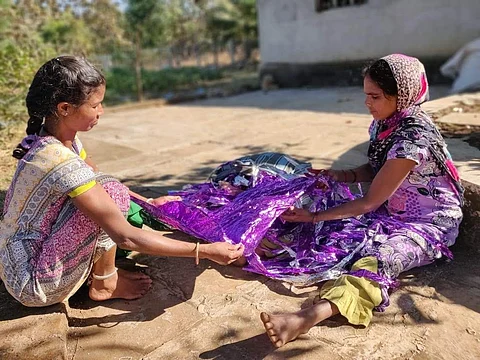

We often hear the term climate change and fear for our future. But what are we doing to reduce it and make this Earth a better place to live in? Eliminating the use of plastic can be a small contribution but even that's going to take a long time to implement globally. So, for the time being, Aarohana EcoSocial Developments has a solution to this problem and it is simple — upcycling plastics. Started by Amita Deshpande and Nandan Bhat in 2013, Aarohana is a social enterprise that is not only involved in upcycling plastics but also provides employment to many tribal women and youth in a village in Dadra and Nagar Haveli.
Amita who did her Master's in Sustainable Development at the Krannert School of Management, Purdue University, in Indiana, USA, says, "When we say upcycling plastics, we mean it. Usually, when waste-pickers take these low-value plastics and sell them at scrap shops, they don't get any monetary value. Low-value plastic includes polyethene bags, multilayered wrappers of gifts, biscuits, cookies, old audio and video cassette tapes, and a lot other household packagings material like cereal, flour and detergent packets. What we decided to do was buy these low-value plastics from them and upcycle them into vanity bags, wallets, tote bags, yoga bags, gym bags and so on. Currently, we are limited to buying these plastics from waste-pickers in Pune and Mumbai."
But what happens after these plastics are bought? Aarohana EcoSocial Developments has been working with tribal women and youth for more than five years now. Amita explains, "I am actually a native of Dadra and Nagar Haveli. I knew that the women and the youth here need employment, so I decided to tie-up with them. It was not difficult for me to convince these women about our initiative and they readily agreed to be part of our work. Once we collect these plastics from waste-pickers, we send them to the women in the village. They segregate, wash and sanitise them. The clean and dry plastic bags are sorted into different colours and are manually cut. We use a traditional charka and a handloom to weave a beautiful fabric that is chemical-free. The unit that we have set up in this village does not use any electric or heat energy to weave the fabric, everything is done manually. We work with 22 artisans, a majority of whom are women."
So the process of upcycling is half complete when it is weaved into colourful fabric. This fabric is later transported to Pune where they have another unit and a team of tailors to stitch a variety of products. Once these colourful bags are stitched into a number of products, they are sold either online or in the market. "The response from people for our products has been amazing. By buying these products, people are indirectly reducing the plastic load on landfills and saving Earth from pollution," says Amita who had to close the two units for some time due to the pandemic.
According to Amita, the orders for these upcycled bags had reduced during the lockdown. But she and her team worked hard to ensure that a few bags got sold and the artisans in the villages got their salaries. She says, "Collecting plastic waste and transporting it to the village had become a huge issue when the lockdown was enforced. Recently, since the relaxation of the lockdown rules, we've re-opened our units. Some of our people now work from home and others work from the office. Gradually, the sale of our bags has picked up but it will take some time to return to normalcy."
Meanwhile, Amita is happy to share that they have started another NGO, My EcoSocial Planet, recently. This NGO aims to create awareness among people about waste segregation, composting at home and so on, through educational videos and campaigns on the field. They will soon be opening another unit in a village near Pune to upcycle plastics and increase the number of products they produce. So, what are you waiting for? Go check out their beautiful bags and own one now!
You can order their products from aarohana.org
